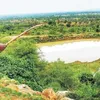How the Hinduja Foundation educates and empowers rural India
With a slew of charitable initiatives, the Hinduja Foundation aims to uplift rural India. During the lockdown, it started the iCare education initiative to help rural students with online classes.
When Mumbai-based Hinduja Foundation’s major educational programme — ‘Road to School’ — came to a halt due to the pandemic, many children in rural areas experienced a significant loss in learning.
To cope with this, the foundation launched the ‘iCare: Volunteer from Home’ initiative, to provide quality education to the deprived students across the country. The initiative saw over 600 employees of various Hinduja Group companies register as teachers to take online classes for these children.
“At this point, if we can do structured curriculum-based courses, there’s nothing like it. But, in the absence of it, we tried to at least engage the children in other extra-curricular activities,” Paul Abraham, President, Hinduja Foundation, tells SocialStory.
Hinduja Foundation — the philanthropic arm of the Hinduja Group — is a public charitable trust that was founded in 1968 by Paramanand Deepchand Hinduja. The NGO strives to ensure a positive socio-economic change in India in the fields of education, water stewardship, healthcare, sustainable rural development, social welfare, and art and culture.

Paul Abraham, President of Hinduja Foundation
The NGO started teaching students, who belonged to the rural areas of Rajasthan, Maharashtra, Madhya Pradesh, Odisha, Chhattisgarh, Karnataka, Tamil Nadu, and Telangana. The volunteers taught subjects ranging from curriculum-based English and Mathematics to creative subjects like mythological tales, painting, crafts, magic, origami, etc. In fact, these online classes were conducted in respective regional languages.
With over 200 online sessions, Hinduja Foundation has impacted around 5500 students through its iCare initiative.
Learning in the times of COVID-19
Shiny Das, an employee of Hinduja Global Solutions, was one of the volunteers who taught the art of thread pulling to these students. She says, “It helped break a mental block that teaching can only take place in a classroom. Also, it was a very overwhelming experience to receive photos of the artwork that the children made after watching my video. It has further strengthened my resolution to volunteer as often as I can.”

Distant learning in villages with iCare
As part of the second phase of the iCare initiative, the foundation also set up televisions or other digital devices in the common area of villages to make up for the dearth of smartphones and tablets in the rural areas. These devices are the source of downloadable content, with fixed hours for different classes.
“With the halting of regular schools and curriculum-based education, there will definitely be significant learning loss, but hopefully we have salvaged some of the issues surrounding this with our initiatives,” says Paul.
The NGO is also involved in foundational level learning, skilling for pre-employment, and nutrition programmes for cognitive development in children in its education vertical. It is also helping many schools to provide affordable education to students in the area.
The foundation
The Hinduja Foundation receives its funding from the CSR spendings of the 10 other Hinduja Group companies, including Ashok Leyland, Gulf Oil, Hinduja National Power, Hinduja Renewables, Hinduja Leyland Finance, Bharat Financial Services, Hinduja Global Solutions, NXTDigital, Hinduja Group Corporate, and Hinduja Tech.
Paul says an estimated budget of Rs 180 crore is allotted to Hinduja Foundation as CSR spendings from the group of companies, and about 25 percent of the amount is spent on education.
“While we have been involved in the many causes, three years ago, we decided to focus our efforts on four main verticals – education, health, water stewardship, and rural development,” he adds.
Potable water for all
Potable water is another cause that the Hinduja Foundation strives towards championing. The NGO focusses primarily on four areas – water-shed development, water ATMs, rainwater harvesting, and restoration of lakes and ponds.
“More than half the population of our country lives in ‘water-stressed’ regions, so our foundation and all Hinduja Group companies have adopted water stewardship as a flagship theme. Under this programme — branded as ‘Jal Jeevan’— we are ensuring sustainable practices at our own facilities to revive rivers and lakes,” says Niyati Sareen, Project Director of Water and Education, Hinduja Foundation.
In fact, to curb water-borne disease among the rural populace, the NGO has installed water purifiers, as well as water ATMs, at different points in the village.

Women from Alwar, Rajasthan, are standing on one of the 15,000-litre rainwater harvesting tanks that they built as part of the Jal Jeevan initiative of the NGO.
With about 80 percent of India’s water bodies severely polluted, Hinduja is very proactive when it comes to the restoration of ponds and lakes. Paul says, at any point in time, the NGO is involved in at least 40 water projects.
Healthcare campaigns
“Through our health campaigns, we invest in primary care and specialised therapy areas, where we find the public health system needs augmentation. We also focus on building insights into areas that are underserved by research like multi-drug resistant TB and Type 1 diabetes,” says Dr. Ashish Bondia, Programme Director of Healthcare at the NGO.
Salma Banu and her family are among many beneficiaries who are receiving help from the foundation. After Salma’s husband, who worked at a shoe store for a daily wage of Rs 300 was laid off, she had little hopes left to treat her two sons who suffer from Type 1 diabetes.
However, the foundation stepped in and helped the boys in receiving consultations, medicines, and insulin shots for free of cost.
Over the years, Hinduja has created hospitals across Chennai, Pune, and other cities, equipping them with the latest medical devices to improve healthcare care in India. It has also launched ‘Mobile Medical Units,’ which provide healthcare facilities in tribal areas.
Developing rural communities
One of the long-term, sustainable, rural development projects that Hinduja is carrying out is in the tribal belt of the Jawahar district in Palghar, Maharashtra. Freddy Martis, Senior Manager – Development, says, “The initiative encompasses multiple villages and addresses aspects related to water, health, education, and agricultural interventions. One of the main goals of our Jawhar project is to enhance income generation and improve the standard of living among tribal communities.”

Sustainable development at Jawhar in Palghar, Maharashtra
Village resource mapping, improved agricultural practices, tree-based farming in Wadi, supporting women-headed families, and water resource management have been the primary rural practices that were undertaken by the NGO.
“We saw how women in Palghar were faced with health issues like uterine displacements because of carrying heavy buckets on their heads for about three-four hours, to and from the water source. With our solar-powered drinking water project in the district, this issue was brought down drastically,” Paul says.
This Jawhar project was awarded the ‘Project of the Year 2017-18’ at the ‘India CSR Summit 2018’ in New Delhi.
“While we have been involved in the many activities, we have realised that scaling up is a primary objective that we need to maintain. And, thanks to the foundation putting out a common agenda across the groups, we will be able to reach more people with our initiatives,” Paul signs off.
Edited by Suman Singh









